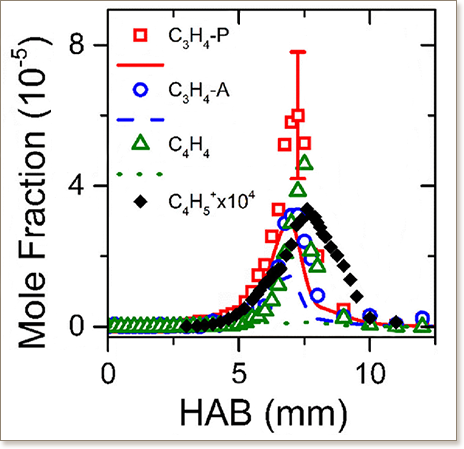Ion chemistry in premixed rich methane flames

Ion chemistry in premixed rich methane flames
B. Chen, H. Wang, Z. Wang, J. Han, A.B.S. Alquaity, H. Wang, N. Hansen, S.M. Sarathy
Combustion and Flame, 202, pp. 208-218, (2019)

External electric field and plasma assisted combustion show great potential for combustion enhancement, e.g., emission and ignition control. To understand soot suppression by external electric fields and flame ignition in spark ignition engines, flame ion chemistry needs to be investigated and developed. In this work, comprehensive and systematic investigations of neutral and ion chemistry are conducted in premixed rich methane flames. Cations are measured by quadrupole molecular beam mass spectrometry (MBMS), and neutrals are measured by synchrotron vacuum ultra violet photoionization time of flight MBMS (SVUV-PI-TOF-MBMS). The molecular formula and dominant isomers of various measured cations are identified based on literature survey and quantum chemistry calculations. Experimentally, we found that H3O+ is the dominant cation in slightly rich flame (ϕ=1.5), but C3H3+ is the most significant in very rich flames (ϕ=1.8 and 2.0). An updated ion chemistry model is proposed and used to explain the effects of changing equivalence ratio. To further verify key ion-neutral reaction pathways, measured neutral profiles are compared with cation profiles experimentally. Detailed cation and neutral measurements and numerical simulations by this work help to understand and develop ion chemistry models. Deficiencies in our current understanding of ion chemistry are also highlighted to motivate further research.

"KAUST shall be a beacon for peace, hope and reconciliation, and shall serve the people of the Kingdom and the world."
King Abdullah bin Abdulaziz Al Saud, 1924 – 2015
Thuwal 23955-6900, Kingdom of Saudi Arabia
© King Abdullah University of Science and Technology. All rights reserved